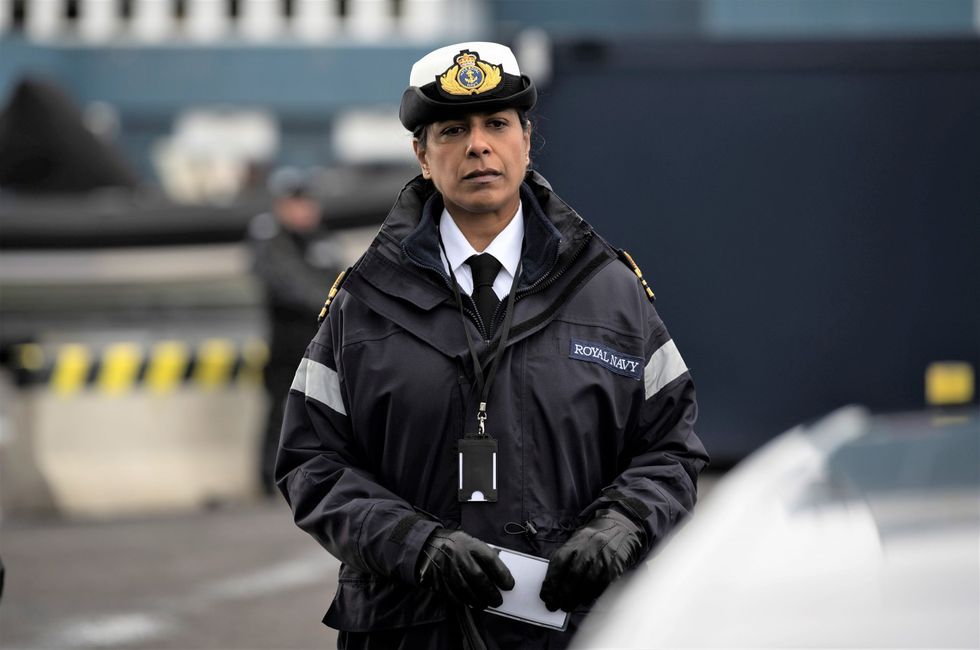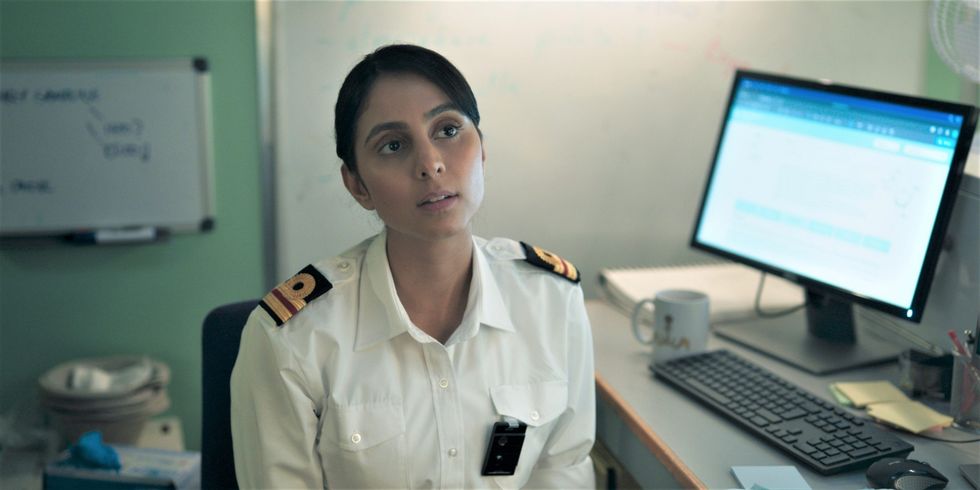Cast member Lolita Chakrabarti says there is nothing 'Asian' about her role
LOLITA CHAKRABARTI has spoken to Eastern Eye about her character, Lieutenant Commander Erin Branning, in the six-part BBC drama, Vigil, which tells of a police investigation after the suspicious death of a crew member on the nuclear submarine while it is out on patrol.
There is nothing Asian about Chakrabarti’s role. Branning, who looks quite intimidating in her uniform, is “a high-ranking naval officer who runs the legal matters for the navy,” explained Chakrabarti.
In fact, the casting reflects remarkable diversity. The submarine is commanded by a black captain, Commander Neil Newsome, played by Paterson Joseph.
The doctor on the submarine is Surgeon Lieutenant Tiffany Docherty (“Doc Doc”), played by Anjli Mohindra. The cast does seem to be a reflection of multicultural Britain. Bhav Joshi has been cast as crime prevention officer John Deerbourne; Fode Simbo as crew member Abiola; Suni La as a GP; and Morgan Archer as a CID officer. “I think the world is opening up, and they’re looking for many more different kinds of voices,” Chakrabarti told Eastern Eye.
“Differences are a plus now, as opposed to not.”

The plot is as follows: when a crew member, Chief Petty Officer Craig Burke (Martin Compston) is found dead on board the Trident nuclear submarine HMS Vigil, police in Scotland are called in to investigate. The catch? The UK’s nuclear deterrent must remain unbroken, so the submarine stays on patrol and Detective Chief Inspector Amy Silva (Suranne Jones) must go aboard to begin an investigation. Although the death was written off as an accidental overdose, Amy suspects foul play. But when the crew close ranks in the face of Amy’s questioning, a new threat overshadows her inquiry.
Filming took place in Scotland not in an actual submarine but in a carefully designed set. Some naval types have quibbled about the detail of life on a submarine, insisting, for example, the interior is much more cramped.
When DCI Silva is winched down to the submarine – it has surfaced to receive her – she is warned not to put her arms up, otherwise she will slip out of her harness.
That bit I can personally confirm is 100 per cent accurate. As a young reporter on the Daily Telegraph, I got sent out from London to Cornwall to cover the “Fastnet disaster”. That was a yacht race which was hit by a hurricane. Nineteen yachtsmen died in the disaster which reached its climax on August 13 and 14, 1979 – but 75 people were saved by Fleet Air Arm crews and another 65 picked up by lifeboats and shipping.
A colleague, Chris Bramwell, and I flew in a hired light aircraft from Heathrow to the Royal Naval Air Station Culdrose in Cornwall. As we were reporters from the Daily Telegraph, the services’ paper, the navy offered to fly one of us out in a Sea King helicopter to report on a search and rescue operation. It fell to me to be flown out to HMS Broadsword, a type 22 frigate which was in charge of the rescue. I forgot whether the winch operator asked me to put my arms up or down.
Anyway, because of the hurricane, I swung through 45 degrees. I was meant to spend the week on Broadsword but being a terrible sailor, I was very sick and had to be winched back after a couple of days. But I did spot what turned out to be a drowned sailor.
Broadsword came up again in my life during the Falklands War. Anyway, the winching scene in Vigil is really true to life.
The drama appears to have taken over as Sunday night’s gripping viewing from Line of Duty, which comes from the same TV company, World Productions.
Chakrabarti is thrilled with the ratings: “In the first week, with sort of collated numbers, we attracted 10.2 million viewers; that’s amazing.”
Talking about her character, she said Branning “is very close to the second in command and relied upon by (the boss) Rear Admiral Shaw, played by Stephen Dillane. She’s placed as liaison with the detective and the investigation on Vigil.”
Chakrabarti was born on June 1, 1969 in Kingston upon Hull and graduated from the Royal Academy of Dramatic Art (RADA) in 1990. Her elder sister, Reeta Chakrabarti, was born on December 12, 1964 in Ealing, went to Oxford and is today a BBC presenter.
Their parents, Bidhan Kumar and Ruma Chakrabarti, arrived in Britain from Kolkata in 1960. Their mum passed away five years ago having always stayed at home to look after her daughters, but their father, is now 88 and retired, having been an orthopaedic surgeon at Selly Oak Hospital in Birmingham and later a consultant at King’s College Hospital in London.
The family did make serious attempts at returning to Calcutta, but came back to Britain.
“It’s the immigrant story, you want to go home,” said Chakrabarti. “The first time was when I was three. And then we went back when I was 10. We stayed for 18 months – and I loved it.” Despite the years in England, she has not stopped being Bengali.
“Definitely, in terms of culture and food. Language is still there. I don’t speak it very often. So, I’m not practising it, but I can understand it when I’m on the tube and things like that. You can’t take the Indian out of you, can you? It’s just there.”
As a writer and an actress, Chakrabarti said she had “always pushed in my career that I play across the board a character rather than racial detail.

So, obviously, that informs every part I play. I played characters that have Asian names, English names, all sorts. I think it’s much more about getting a team (for Vigil) that reflects the world they want to show. We, too often, look at things through a racial lens. In most stories, it’s completely irrelevant. What has happened in the last few years, which is quite divisive, is everyone talks about race. If it’s a story set in India or in a Jamaican community in Britain, then it’s extremely relevant. But otherwise, we’re all just people, and we’ve kind of forgotten to look at things like that.”
She added: “Years ago, it used to be one kind of story for people like us. And now it just isn’t the case.”
Meanwhile, in an interview with the BBC, Mohindra spoke of her role, Surgeon Lieutenant Tiffany Docherty, the submarine’s doctor: “She cares deeply for Vigil’s crew, she is the go-to person for the personal and mental issues that can come as an occupational hazard being aboard a submarine, lonely and isolated from life on land, for such long stints. She has grafted incredibly hard to get where she is. She was selected as part of the Navy’s
Medical Training Grant Scheme, who sponsored her degree in medicine.
On Monday (13), Mohindra told the BBC’s Asian Network: “It’s such an exciting time for us at the moment.”
The diversity stretches to the writing. Last Sunday’s (12) episode, the fourth, was written by Chandni Lakhani, who was part of the BBC’s first “drama room writer development group”.
Again, there is nothing remotely “Asian” in the episode.



















